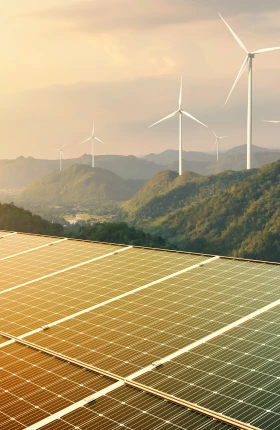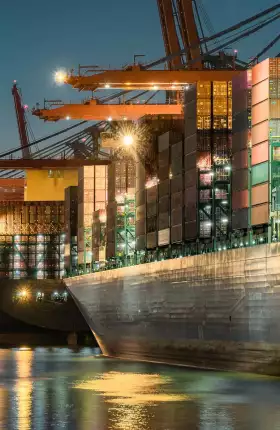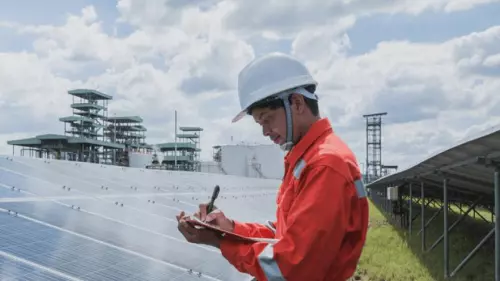Our Climate Change and Sustainability Services
BCG works with clients to accelerate their climate and sustainability journey. We help them identify and harness climate innovation, embed sustainability at scale into their business, and capture the value they create. Our work is as far-reaching as the challenge.
Many companies underestimate the pace and scope of change required to achieve sustainability at scale. We work with clients to transform their business for a new decarbonized era.
Societies and economies must take action today to thrive in the future. We work with national and local governments and corporations to build their climate-risk resiliency.
A growing number of large institutional investors today are incorporating sustainable finance into their portfolios. Learn more about sustainable finance from BCG's social impact experts.
Decarbonizing the global economy will require the rapid expansion of renewable energy sources and a firm embrace of business sustainability strategy by heavy industry. We are working with clients to pave the way forward.
Our experts help clients seize opportunities in the fast-growing alternative proteins industry—and create a more sustainable future.
Agriculture is a major driver of global greenhouse gas emissions. Our sustainability consulting team works with clients to develop strategies for addressing those emissions while strengthening the stability of global food systems.
Decarbonization is just one of the many steps necessary to protect our planet. We help clients build comprehensive environmental strategies that align business priorities with the boundaries humanity must respect to keep the planet habitable.
BCG works with companies to improve operational sustainability in procurement and supply chain and unlock the value from sustainable operations.
Companies are facing intense pressure to remove carbon from their operations. We take a sector- and company-specific approach to help clients identify and implement high-impact decarbonization methods.
We draw on deep commercial, technical, and regulatory expertise to help companies identify the right strategies, investments, and operating model around low-carbon and renewable energy.
Achieving net zero will cost $3 to $5 trillion annually but offers significant long-term value and job creation. Our Green Growth Accelerator helps clients drive climate innovation and growth, unlocking new revenue streams and lasting competitive advantages.
Our Clients' Success in Climate Change and Sustainability
BCG leverages partnerships and proprietary products to support clients on their net-zero journey.
Video
May 2, 2025
BCG worked with Decathlon to embed accessibility, sustainability, profit and growth into a circularity model that forms the heart of Decathlon’s strategy to be the world’s largest lowest impact sports retail company.
Video
April 2, 2025
What happened when Sysco chose to ramp up its sustainability efforts? It created powerful opportunities for cost cutting and growth—for both the company and its clients.

Client Success
BCG experts helped launch a clean energy tech hub with $80M+ in funding—driving innovation and jobs in underserved communities.
Video
March 4, 2025
BCG partnered with the Casillo Group to build a brand and business model for a breakthrough food product that’s good for us, good for the planet, and good for business.
Video
December 12, 2024
BCG is helping American Forest Foundation scale up a nature-based carbon credit program and deliver 1 billion tons of climate impact by 2050.
Video
August 29, 2024
Learn how the Global Impact Coalition (GIC) is helping to reduce emissions and advance circularity in the hard-to-abate chemical sector.
Our Solutions for Climate Change and Sustainability

CO2 AI
Part of our partner ecosystem, CO2 AI enables organizations to measure, simulate, reduce, and track their environmental footprint at scale.
CO2 AI

Supply Chain Net Zero Academy
BCG’s sustainability platform upskills suppliers and procurement teams to accelerate Scope 3 decarbonization and their journey to net zero.
Supply Chain Net Zero Academy

Circelligence by BCG
Circelligence calculates a company's circularity, helping clients advance sustainability and maximize value with fewer raw materials.
Circelligence by BCG

CO2 FI by BCG
CO2 FI helps financial institutions navigate their complex climate roadmap and attain net zero.
CO2 FI by BCG
KEY Impact Management by BCG X
KEY Impact Management is a one-stop-shop for program management, managing complexity on every phase of a transformation.
KEY Impact Management by BCG X
Video
Video
Energy Transition Optimizer by BCG X
Energy Transition Optimizer is cutting-edge AI and advanced analytics solution designed to revolutionize large-scale energy projects.
Energy Transition Optimizer by BCG X
The Economic Case for Climate Action
Climate action is both essential and economically beneficial. Investing 1-2% of GDP in mitigation and adaptation by 2100 could save 11-27% of GDP—which could be used to triple global healthcare spending, invest in infrastructure, and fund global defense costs.

Article
March 12, 2025
The investments necessary to mitigate and adapt to climate change are far less than the cost of inaction—11% to 27% of global GDP by 2100.
Video
January 31, 2025
The Cost of Inaction on Climate
Climate risks pose challenges to companies’ profitability, performance, and value creation. Understanding the risks and investing in solutions is crucial, say WEF’s Gim Huay Neo and BCG’s Rich Lesser.

The BCG-WEF report explores how companies can gain competitive advantage by turning the net-zero challenge into a business opportunity.

Article
September 9, 2024
BCG has quantified the staggering cost of inaction on climate. To avoid worst-case scenarios, the private sector and other stakeholders must ramp up their collaboration.
Our Climate and Sustainability Partnerships
Discover what’s top of the agenda for public and private sector leaders at this year’s critical climate gathering.
Press Release
September 20, 2021
Breakthrough Energy Catalyst, co-founded by BCG, is working to accelerate climate innovation, including the development and scaling of green hydrogen and sustainable fuel.
Press Release
September 15, 2022
BCG recently acquired Quantis, a pioneering environmental sustainability consultancy, to help further strengthen its climate and sustainability expertise and transformation capabilities.
Press Release
March 1, 2023
BCG has partnered with the ESG Data Convergence Initiative (EDCI), a first-of-its-kind, industry-led initiative to drive convergence on meaningful ESG metrics for the private equity industry.
Center for Sustainability Policy and Regulation
Press Release
The Center for Sustainability Policy and Regulation brings together experts with deep industry- and technology-specific knowledge, providing clients in both the public and private sectors with a comprehensive view of the policies and regulations they face today—and may face tomorrow.
Meet Our Climate Consulting Leaders
Our climate change and sustainability consulting team helps clients seize the opportunity in the emerging net-zero world.
Explore Our Insights on Climate Change and Sustainability

Article
May 6, 2025
Forests can anchor a high-integrity voluntary carbon market—if developers, landowners, and market leaders shift from transactional credit models to long-term asset stewardship.

Article
May 1, 2025
As they face unprecedented volatility in global agrifood supply chains, decision makers can act today to build long-term resilience and competitive advantage.

Article
March 5, 2025
Should cargo carriers wait for regulatory clarity before taking proactive steps toward achieving zero-carbon shipping? The short answer is no.
Explore More
Capability
Social Impact
Industry






















